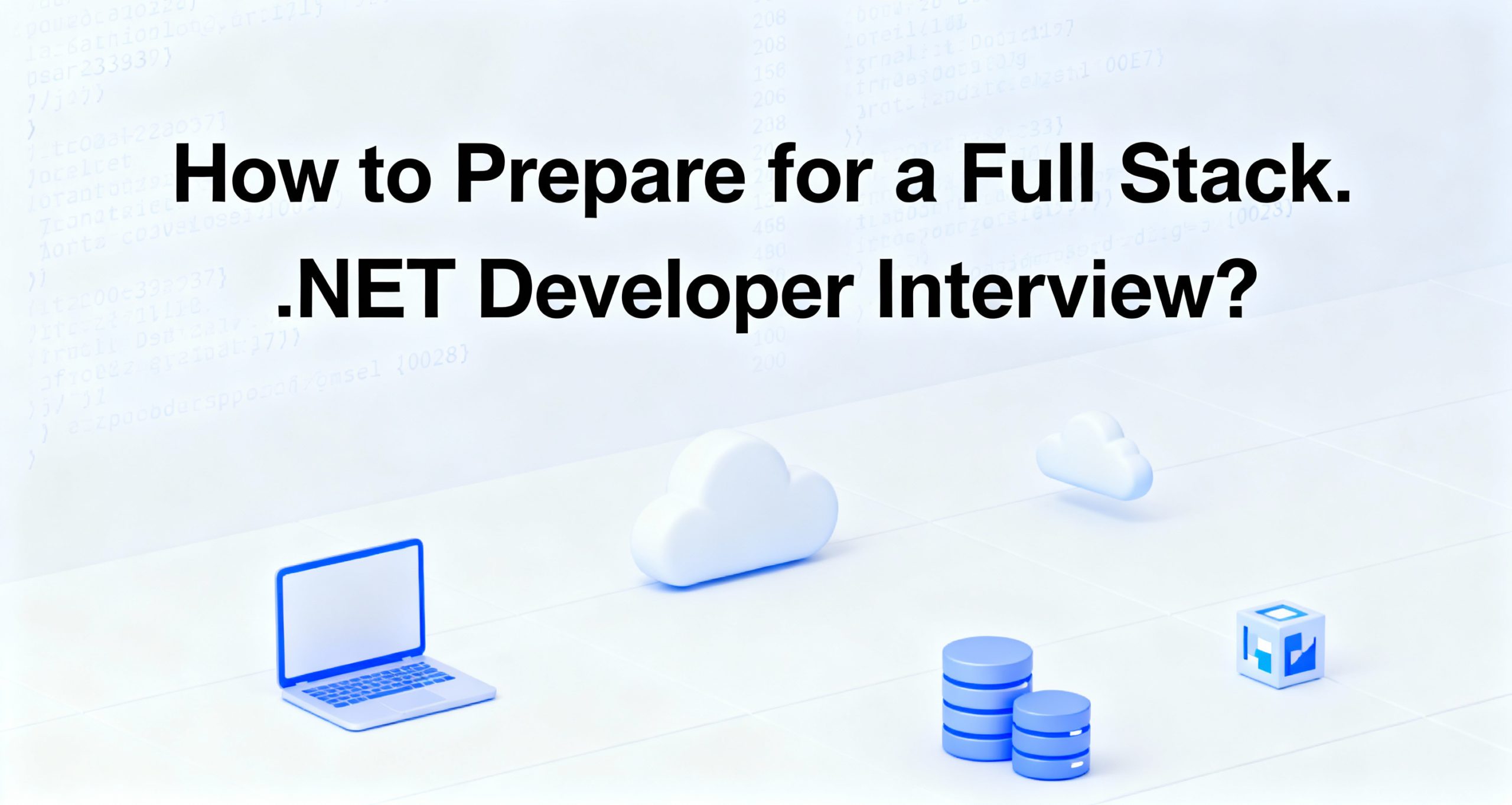Contents
Full Stack .NET interview preparation is important for anyone who wants to succeed as a Full Stack .NET developer. This role covers backend, frontend, databases, APIs, and sometimes deployment, so understanding these areas helps you perform confidently during interviews.
1. What Do Companies Look for in a Full Stack .NET Interview?
The majority of the interviewer processes have the same flow; first, the basic questions are asked and later on those scenario-based questions are given. Expect C#, ASP.NET Core, building APIs, SQL querying, and front-end knowledge to be part of the questioned areas. In case you worked on a project, you should explain the connection of the parts because this is a point of interest to almost every interviewer.
Interviewers expect a Full Stack .NET candidate to understand how all parts of an application work together in a Full Stack .NET project.
2. Why Full Stack .NET Interview Preparation Matters
Proper planning helps you perform better during any Full Stack .NET interview because Full Stack .NET skills require clarity and practice.
- You sound clearer and more confident
- You handle coding tasks with less pressure
- You can explain your project without gaps
- You appear more “job-ready,” which matters a lot in interviews
Companies prefer candidates who understand how things work in practical situations rather than someone who memorized answers.
3. Who Benefits the Most from Full Stack .NET Interview Preparation?
Most Full Stack .NET candidates improve faster when they follow a structured daily plan.
Anyone entering the Full Stack .NET ecosystem — from freshers to working professionals — can benefit from structured preparation. Consistent preparation improves your chances of clearing any Full Stack .NET interview.
4. When Should You Begin Your Full Stack .NET Preparation?
There’s no fixed timing, but ideally:
- Start once you’re comfortable with C# basics because this is the foundation for any Full Stack .NET developer.
- Begin practicing SQL as early as possible
- Work on a small personal project before your placement drive or job search
- Give it yourself at least a month of consistent revision
Most of the candidates who prepare steadily rather than rushing at the last moment perform better.
A steady learning approach always supports better outcomes in Full Stack .NET interviews.
5. Where Should You Focus Your Skills for a Full Stack .NET Role?
Backend Skills for a Full Stack .NET Developer
These are the core areas most Full Stack .NET interviews focus on.
- OOPs
- Interfaces, inheritance
- Generics
- Exceptions
- Middleware
- Controllers, models, services
- Dependency Injection
- Entity Framework Core and LINQ
These backend concepts form the core of most Full Stack .NET interviews.
Database Skills Required for a Full Stack .NET Developer
Practice queries daily, especially joins, group by, functions, and stored procedures. Many companies directly ask you to write queries on the spot.
Frontend Requirements for a Full Stack .NET Interview
You don’t need to be an expert, but you should know:
- How a webpage works
- How JavaScript handles events or fetches data
- Basic HTML/CSS layouts
Tools
Version control (typically Git) is almost always expected. Basic deployment or hosting knowledge is a bonus.
6. How Should You Prepare for a Full Stack .NET Interview? (Step-by-Step Plan)
Step 1: Strengthen Your C# Foundations
Spend time understanding how C# handles memory, exceptions, and a sync programming. Interviewers notice when you understand the language instead of memorizing points.
Step 2: Learn ASP.NET Core in a Realistic Way
Try building a small API on your own — something simple like user login or product listings. This improves your confidence more than reading a guide.
Step 3: Practice SQL Regularly
Even if you know .NET very well, weak SQL can affect your interview outcome. SQL is used everywhere.
Step 4: Work on a Project and Truly Understand It
You don’t need a huge project for a Full Stack .NET interview. A medium-sized project is enough as long as you know:
- How the API works
- How data flows
- What tables store what
- How authentication is handled
Be ready to explain challenges you faced this feels genuine.
Step 5: Update Your Resume Thoughtfully
Mention tools, technologies, and project responsibilities clearly. Many candidates fail interviews simply because what they write and what they explain don’t match.
Step 6: Give Yourself a Few Mock Interviews
- Mock interviews help reduce hesitation and highlight areas where you need more revision.
- Strong fundamentals and consistent practice are the key to succeeding in a Full Stack .NET interview.
- Mastering each layer of development will help you perform better in any Full Stack .NET role.
Frequently Asked Full Stack .NET Interview Questions
Q1. Why do many companies choose .NET Core today?
People use .NET Core because it works on any machine and it’s faster. The old .NET feels outdated, so companies just prefer the newer one.
Q2. What does Dependency Injection do in ASP.NET Core?
Dependency Injection just saves you from writing extra code. Instead of you creating stuff inside your class, the system gives it to you. That’s all. Makes the code less messy.
Q3. How do you explain Entity Framework Core to a beginner?
EF Core is basically a shortcut. You don’t need to write SQL again and again. You write simple C# and it handles the database part for you.
Q4. What is the purpose of Middleware?
Middleware components help requests pass through a pipeline, allowing you to add features like logging or authentication.
Q5. What’s the simplest explanation of REST API?
It’s a way for two systems to communicate using standard HTTP methods like GET or POST.
Q6. Does Naresh IT provide interview preparation support for Full Stack .NET?
Yes. Naresh IT offers dedicated placement batches, mock interviews, technical assessments, and mentor support that help students strengthen their interview preparation. These resources guide learners through real-time project discussions and commonly asked .NET interview questions.
Click here for Full Stack .NET
